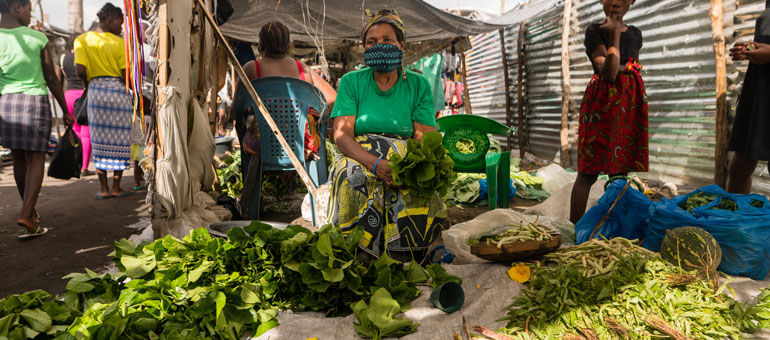Transforming agri-food systems is the high road to achieving the 2030 Sustainable Development Agenda, and a rigorous, science-based monitoring framework is needed to steer the process and keep all stakeholders accountable, a consortium of experts say in a new "viewpoint" published in the Food Policy journal.
"The goal of food system transformation is to generate a future where all people have access to healthy diets, which are produced in sustainable and resilient ways that restore nature and deliver just, equitable livelihoods," the paper says.
It proposes a systems-based framework to define the architecture for a comprehensive monitoring agenda covering five thematic areas and developing concrete indicator domains to track closely, offering evidence-based support to policy makers around the world. Metrics and monitoring are necessary to ensure accountability and progress towards timebound goals including the Sustainable Development Goals, the Paris Climate Agreement and the forthcoming Kunming Biodiversity targets, all of which require food systems transformation in order to succeed.
"This monitoring project is exciting because it involves over 50 scientists from 27 academic institutions, non-governmental organizations, and UN agencies from nearly all continents to design a science-based observational system to monitor food systems globally. No rigorous mechanism currently exists to measure and track all aspects of food systems, their interactions, and their changes over the next decade," says lead author Jessica Fanzo, Bloomberg Distinguished Professor of Global Food Policy and Ethics at the Berman Institute of Bioethics at Johns Hopkins University.

The goal of food system transformation is to generate a future where all people have access to healthy diets. © GAIN
"We have now had the United Nations Food Systems Summit and Member States have committed to transform food systems. The accountability mechanism we are launching today will help tell us how serious those commitments actually are. So, stay tuned!" says Lawrence Haddad, Executive Director of the Global Alliance for Improved Nutrition (GAIN).
"Data is only useful if it is connected to the policy decision making processes that ultimately are the ones that will generate the change needed towards food system transformation. Therefore, the objective is to propose and implement a parsimonious, rigorous set of indicators that are readily useful for decision makers and in which they can have the utmost confidence," says José Rosero Moncayo, another one of the lead authors and Director of the Statistics Division in FAO’s Economic and Social Development Department.
This monitoring project is exciting because it involves over 50 scientists from 27 academic institutions, non-governmental organizations, and UN agencies from nearly all continents to design a science-based observational system to monitor food systems globally.
While the urgent need for transformation is undeniable, the paper finds that "there is currently no coordinated effort to monitor all aspects of food systems and their interactions."
Analyzing food systems from a systems perspective can, the authors argue, be useful in developing holistic interventions that address the inherent coupled dynamics, feedback loops and distal impacts that characterize the way agri-food systems interact with factors such as sustainable agriculture, health, the environment and socio-economic power asymmetries.
The accountability mechanism we are launching today will help answer that question and tell us how serious those commitments actually are.
The almost 50 authors represent an international, multidisciplinary research collaboration including experts from 27 academic institutions, non-governmental organizations and UN agencies from nearly all continents.
The paper represents the initial step of an effort to put together a multidisciplinary research collaboration and build an initial architecture of the monitoring framework. The process will welcome new collaborators to finalize the approach and develop a coherent set of indicators in a transparent and inclusive consultation process. Subsequently, biannual publications will track progress and interpret the status and trends present in the world’s food systems.
Data is only useful if it is connected to the policy decision making processes that ultimately are the ones that will generate the change needed towards food system transformation.
The vision
The overarching framework is built around five thematic areas: Diets, nutrition and health; Environment and climate; Livelihoods, poverty and equity; Governance; Resilience and sustainability.
It would deepen and broaden the "food system dashboard" that FAO, GAIN and Johns Hopkins University have already created with other partners and that feeds from other platforms such as FAOSTAT.
One aim of the framework is to build and achieve consensus on the use of quantitative measures of food systems impacts which can contribute to true-cost accounting for food systems, so that negative externalities – such as labor exploitation, obesity, poverty and natural resource depletion – are no longer ignored.
A bedrock theme of the proposal is that ensuring the human rights of all is key to transforming food systems from their current state to one that is equitable. That means measuring the scope of national universal social protection programs, which often skip over “invisible” and informal participants in agri-food systems, as well as making sure that consumers, smallholders and workers are able in fact to exercise their rights vis-à-vis the actual market power held by international corporations in the agricultural input, output and retail food product industries.
Metrics would also be useful for more intangible issues related to making the world a safe place for humanity and all species, such as biosphere integrity and shared vision. The authors note that the country-level dialogues held as part of the UN Food Systems Summit process have involved local multi-stakeholder platforms that have catalyzed the development of shared visions in many places.